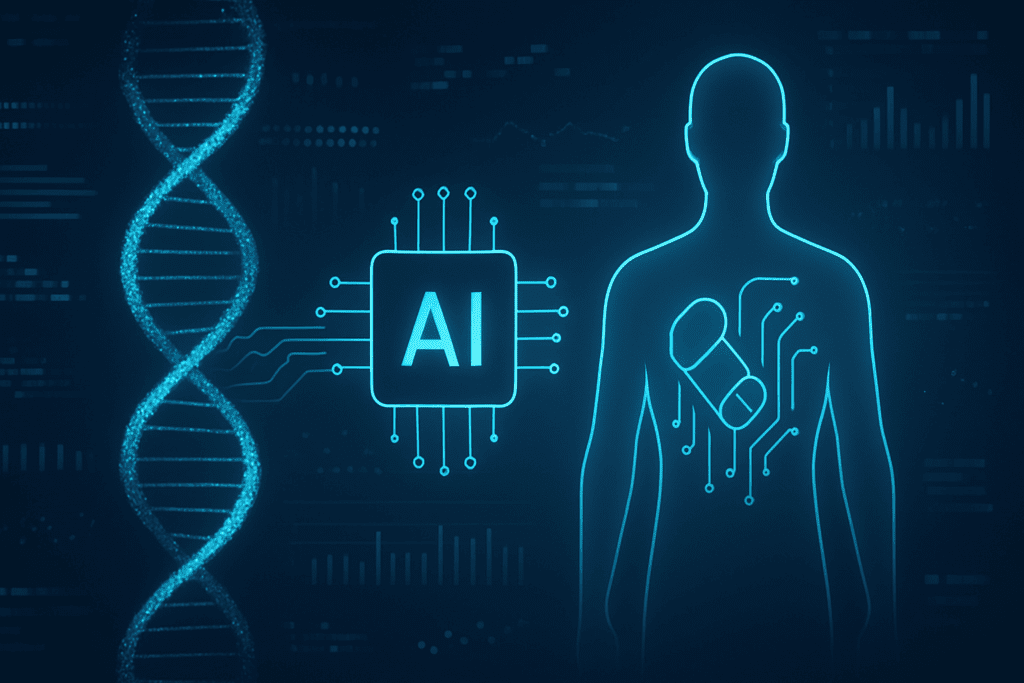Introduction: Revolutionizing Healthcare Through Innovation
Breakthrough medical research discoveries have consistently reshaped healthcare, enhancing patient outcomes, revolutionizing treatments, and optimizing clinical efficiency. In recent years, technological advancements have accelerated these developments, particularly through the integration of artificial intelligence (AI). Today, artificial intelligence healthcare companies are at the forefront, pioneering unprecedented changes across medical specialties. Healthcare AI platforms now facilitate predictive diagnostics, precision medicine, and patient-centered care, making healthcare more accurate, personalized, and effective than ever before. This article explores recent transformative discoveries, highlights top healthcare AI companies driving innovation, and examines how these advances are reshaping medical practices globally.
You may also like: Revolutionizing Healthcare: How AI in Medicine Is Enhancing Diagnosis, Treatment, and Patient Outcomes

Understanding Breakthrough Medical Research Discoveries
Breakthrough medical research discoveries encompass substantial, innovative advancements that significantly alter current medical practices or understanding. Unlike incremental developments, these discoveries typically result in transformative shifts, affecting diagnosis, treatment, and patient care. Recent examples include the groundbreaking development of CRISPR gene-editing technology and advances in immunotherapy treatments for cancer. Such discoveries often integrate multidisciplinary research, where healthcare AI companies play a vital role, bridging computational intelligence with medical expertise. The impact of these innovations extends far beyond immediate clinical applications, influencing healthcare policies, ethical considerations, and public health strategies.
The Rise of Healthcare AI Companies in Medical Research
The past decade has witnessed exponential growth in healthcare AI companies, fundamentally changing the landscape of medical research. These companies leverage AI technologies like machine learning, neural networks, and deep learning to enhance medical diagnostics and treatments. Leading providers of AI technology in health care such as Google’s DeepMind, IBM Watson Health, and Tempus have significantly contributed to medical research breakthroughs. AI-driven data analysis enables rapid identification of complex patterns in large datasets, aiding in earlier detection of diseases such as cancer and Alzheimer’s. Healthcare companies using AI technologies are thus essential in translating extensive medical data into actionable insights, substantially improving patient outcomes.

Breakthrough Medical Research Discoveries in Cancer Treatment
Cancer treatment has been dramatically transformed by breakthrough medical research discoveries facilitated by healthcare AI platforms. AI technologies from medical AI companies like PathAI and Paige.AI are revolutionizing pathology by automating image analysis, increasing diagnostic accuracy, and accelerating disease detection. Furthermore, AI healthcare startups are exploring personalized cancer treatments, tailoring therapy plans based on genetic profiling and patient-specific data. For example, Tempus employs AI-driven genomic sequencing to identify optimal treatment pathways, substantially improving survival rates and quality of life for patients with previously limited treatment options.
AI in Cardiovascular Research: Leading Breakthroughs
Top artificial intelligence healthcare companies are actively driving innovation in cardiovascular medicine, addressing one of the most significant causes of global mortality. Healthcare AI platforms developed by companies such as HeartFlow and Caption Health employ advanced algorithms to enhance cardiac imaging analysis and predictive diagnostics. HeartFlow’s AI-powered technology creates personalized, detailed coronary artery models, significantly reducing unnecessary invasive procedures. These advancements by medical AI companies illustrate AI’s potential to drastically improve diagnostic accuracy and patient outcomes in cardiovascular care.

Neurological Innovations Powered by Medical AI Companies
Breakthrough medical research discoveries in neurology heavily depend on contributions from healthcare AI companies. Companies like Viz.ai and Neural Analytics have made notable strides in stroke detection and treatment optimization through AI-driven imaging analyses. AI healthcare startups are also working on early detection and intervention in neurodegenerative conditions like Alzheimer’s disease. Algorithms capable of detecting subtle early-stage indicators promise timely and potentially life-changing interventions, thus profoundly impacting neurological patient care.
The Role of AI Healthcare Startups in Personalized Medicine
Personalized medicine represents one of the most exciting fields propelled by AI healthcare startups. These startups leverage extensive patient data, including genetic information and lifestyle factors, to tailor medical treatments uniquely suited to individual needs. Medical AI startups such as BenevolentAI and Insilico Medicine have advanced drug discovery processes significantly, reducing the time and cost associated with developing targeted therapies. Personalized medicine breakthroughs driven by health AI companies underscore AI’s transformative impact on healthcare, enabling precise and efficient treatments tailored to individual patient profiles.

Ethical Considerations in Breakthrough Medical Research Discoveries
Despite significant advancements, breakthrough medical research discoveries raise crucial ethical considerations. AI-driven healthcare necessitates stringent oversight and robust regulatory frameworks to address patient privacy, data security, and equitable access concerns. Leading healthcare AI companies are proactively establishing ethical guidelines to govern data use and algorithm transparency. These efforts ensure responsible application of technology, addressing potential biases and promoting equitable healthcare outcomes. The ongoing dialogue surrounding ethics and regulation remains vital in maintaining public trust and ensuring the sustainable integration of AI into medical practice.
Future Prospects: What Lies Ahead for Breakthrough Medical Research Discoveries
Looking forward, breakthrough medical research discoveries are expected to increasingly rely on advanced AI integration. Emerging medical AI startups and established healthcare companies continue to innovate, exploring new applications ranging from robotic surgery to AI-driven mental health interventions. Collaboration between healthcare providers, medical AI companies, and regulatory bodies will further accelerate these advancements, ensuring technology remains beneficial, accessible, and ethically sound. The convergence of biotechnology, computational power, and AI promises a future where medical research continuously reshapes healthcare delivery, substantially improving global health outcomes.

Frequently Asked Questions (FAQ)
1. How Are Breakthrough Medical Research Discoveries Influencing Public Health Policy?
Breakthrough medical research discoveries significantly impact public health policy by informing evidence-based decisions and resource allocation. Healthcare AI platforms help policymakers analyze vast health data, predicting disease outbreaks and enabling proactive strategies. For example, healthcare companies using AI can forecast influenza peaks and guide vaccination campaigns effectively. This predictive capacity ensures public health policies are both timely and targeted, leading to improved community health outcomes. As these discoveries evolve, policy frameworks increasingly prioritize AI-driven insights for efficient healthcare management.
2. What Role Do Healthcare AI Companies Play in Reducing Medical Costs?
Healthcare AI companies substantially reduce medical costs through enhanced diagnostic precision and predictive analytics, thereby avoiding unnecessary procedures. For instance, leading providers of AI technology in health care, like HeartFlow, have significantly decreased invasive cardiac procedures by improving diagnostic accuracy. Additionally, medical AI companies streamline administrative tasks, automating insurance processes and reducing operational expenditures. This efficiency translates into reduced financial burdens on healthcare systems and patients alike, fostering more affordable healthcare services.
3. Who Is Leading AI in Healthcare, and What Are Their Innovations?
Top artificial intelligence healthcare companies currently leading innovation include IBM Watson Health, Google’s DeepMind, and PathAI. These organizations pioneer applications like advanced disease detection algorithms, personalized treatment recommendations, and genomic analyses. PathAI, among leading medical AI companies, has innovated AI-driven pathology solutions, significantly enhancing cancer diagnosis accuracy. These advancements exemplify how AI healthcare startups and established companies continually set new standards for healthcare excellence through technology-driven innovations.
4. How Do AI Medical Device Companies Ensure Patient Safety?
AI medical device companies prioritize patient safety by strictly adhering to regulatory standards and rigorous testing protocols. Companies such as Caption Health undergo extensive clinical validations to ensure the safety and reliability of their diagnostic tools. Additionally, healthcare AI platforms integrate real-time monitoring systems that alert medical professionals to potential patient risks instantly. Through continuous AI model retraining and validation, these companies uphold stringent safety standards, maintaining patient trust and safety as their highest priority.
5. What Are the Long-Term Implications of Healthcare AI Platforms on Patient Privacy?
Long-term implications for patient privacy include enhanced cybersecurity measures and regulatory oversight. Healthcare AI platforms implement advanced encryption and anonymization techniques to protect sensitive patient information. Health AI companies collaborate closely with cybersecurity experts to regularly assess and upgrade their protective measures. Despite these safeguards, ongoing vigilance is necessary as technological advancements present new privacy challenges, necessitating continuous evolution of privacy frameworks to protect patient data effectively.
6. What Unique Challenges Do AI Healthcare Startups Face Compared to Larger Companies?
AI healthcare startups typically face challenges such as limited funding, scalability issues, and regulatory hurdles compared to established companies. Startups often rely heavily on venture capital, requiring substantial validation to attract investors. Additionally, they must rapidly demonstrate effectiveness and scalability of their healthcare AI platforms, a pressure not as acute for larger, established companies. Regulatory approval processes can also disproportionately strain startups, necessitating substantial resources for compliance and market entry.
7. How Do Medical AI Startups Foster Innovation Differently from Established Firms?
Medical AI startups often foster innovation through agile methodologies, rapid prototyping, and focused niche applications. Unlike established healthcare ai companies, startups can pivot quickly, exploring emerging technologies or niche markets swiftly. For example, medical AI startups like BenevolentAI emphasize drug discovery in specialized therapeutic areas overlooked by larger companies. This targeted approach, coupled with less bureaucratic inertia, allows startups to rapidly innovate and introduce novel solutions effectively.
8. What Are Some Emerging Trends Among Top Healthcare AI Companies?
Emerging trends among top healthcare AI companies include the integration of explainable AI, federated learning, and AI-powered telemedicine. Explainable AI enhances transparency, allowing clinicians to understand AI decision-making processes better. Federated learning enables multiple institutions to collaboratively train AI models without sharing raw patient data, preserving privacy. Additionally, AI-powered telemedicine expands remote healthcare delivery capabilities, significantly broadening healthcare accessibility, particularly in rural or underserved areas.
9. How Are Breakthrough Medical Research Discoveries Affecting Global Health Equity?
Breakthrough medical research discoveries are increasingly being leveraged to address global health disparities, promoting equity. AI healthcare startups provide affordable diagnostic solutions to resource-limited settings, dramatically enhancing healthcare accessibility. Medical AI companies, such as Butterfly Network, offer portable ultrasound devices that deliver quality diagnostics in rural areas previously underserved. These initiatives substantially reduce global healthcare disparities, improving health outcomes universally by providing equitable access to advanced medical technologies.
10. What Psychological and Social Impacts Might Arise from Integrating AI in Healthcare?
Integrating AI into healthcare may lead to profound psychological and social impacts, including shifts in patient trust and altered patient-provider relationships. While healthcare AI companies enhance diagnostic accuracy, reliance on technology might initially erode patient trust in healthcare decisions. Conversely, transparent and explainable AI healthcare platforms can build confidence and facilitate shared decision-making between patients and providers. Socially, widespread AI integration may redefine healthcare roles, emphasizing human skills in empathy and communication, ultimately reshaping healthcare workforce dynamics positively.
Conclusion: Harnessing Breakthrough Medical Research Discoveries for Better Health
Breakthrough medical research discoveries have undeniably transformed healthcare, driven by the innovative contributions of top healthcare AI companies and emerging startups alike. As artificial intelligence continues its integration into healthcare, stakeholders must embrace collaborative efforts and responsible practices to maximize benefits and mitigate risks. These discoveries offer powerful insights and practical solutions, revolutionizing patient care and medical practices worldwide. Embracing AI-driven innovations with ethical considerations ensures healthcare advancements remain beneficial, equitable, and sustainable, ultimately enhancing human health and well-being globally.
Further Reading
Top 10: Healthcare AI Companies
Top 35 Medical AI Companies: Privately Held US Innovators to Watch


